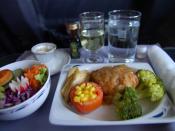Background: The 9-11 tragedy has left its residual effects on the American
business environment in much the same was as untimely encounter with a skunk leaves its scent behind long after the encounter ends. While the American consumer's confidence in the airline industry is steadily climbing on the polls, the reality is that given the option, many travelers are selecting methods of transportation other than air travel. The result is that the damaged Airline industry is having a more difficult time shaking off the effects of 9-11, and charting a course forward toward profitability.
To counteract this trend, the following recommendations are prepared for Continental Airlines. The campaign name is "Continental's Premium Pass(ages)." At the core of this campaign is a renovation of the Continental "One Pass." This existing frequent flier mileage program has received high awards for customer satisfaction in the late nineties, but the current name carries no brand awareness.
Each area of promotion, strategy to increase brand awareness, and tool used to increase ticket sales will be a facet of the "Continental Premium Pass(ages)" of CPP service upgrade.
The mindset of this promotion is just as important as the tools employed. In 50 years, 9-11 will be seen as a blip on the economic radar screen. Today, it is a large aberration. Just as we can look back at the stock market crash of 1929 as an event with both a definitive beginning and ending point, the 9-11 attacks will also be viewed from this vantage point. This perspective will also permeate the CPP campaign, as the company moves forward by linking today's performance and reputation to that of 1999, 2000, and early 2001. The Company can no longer expect to build success by referring to performance in light of how we have recovered from 9-11.


